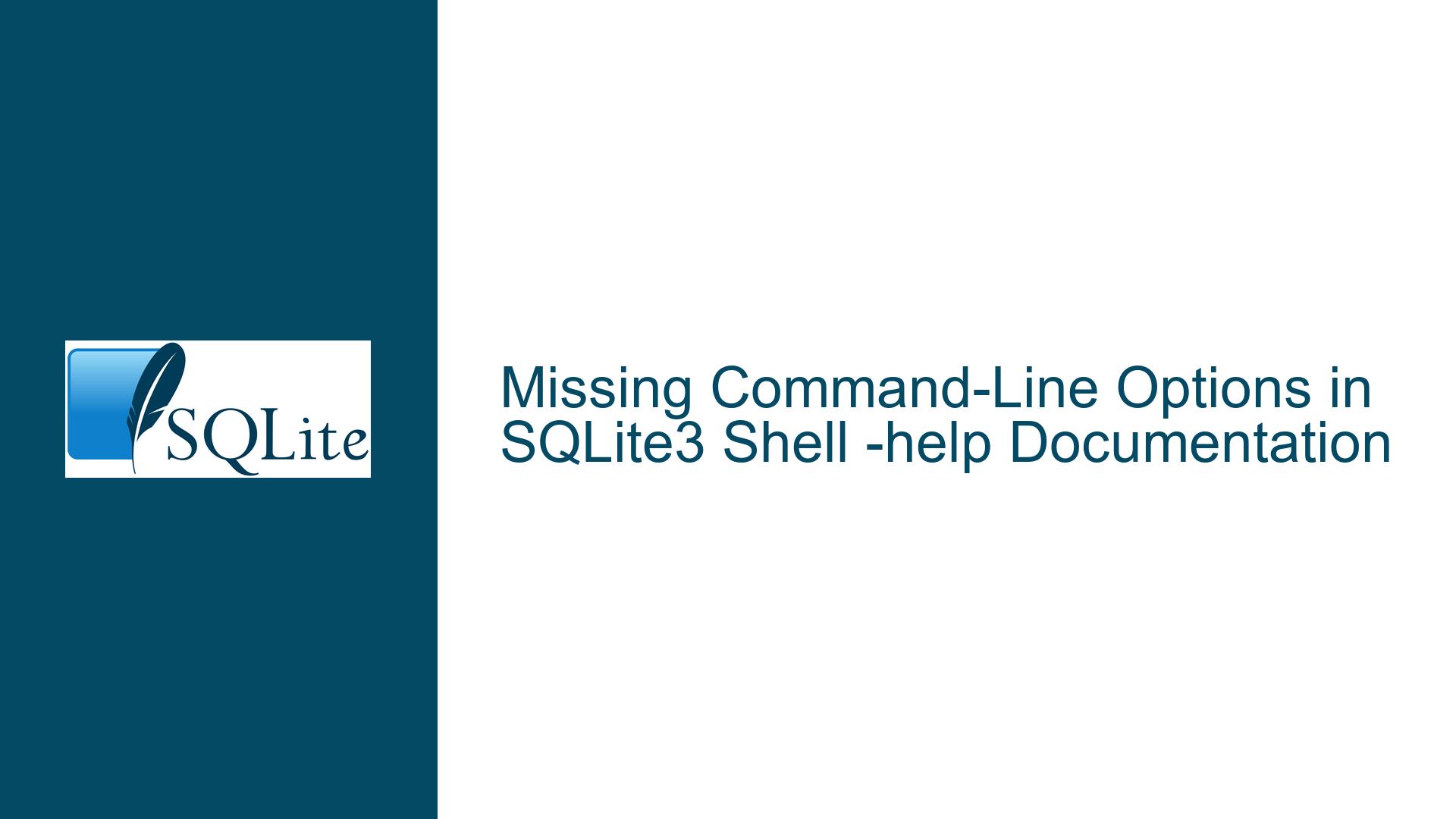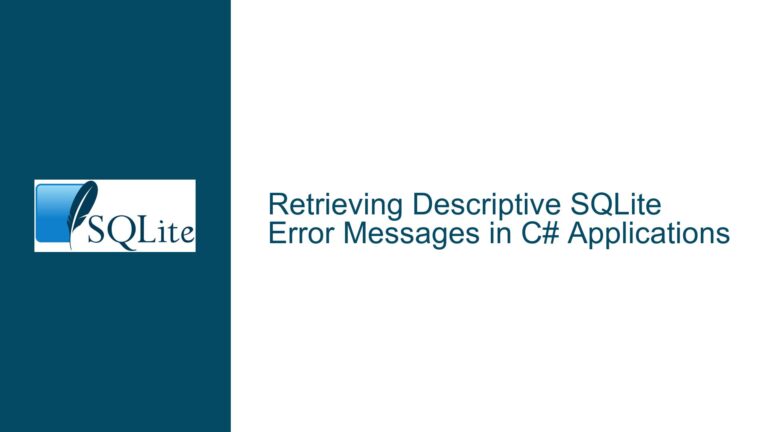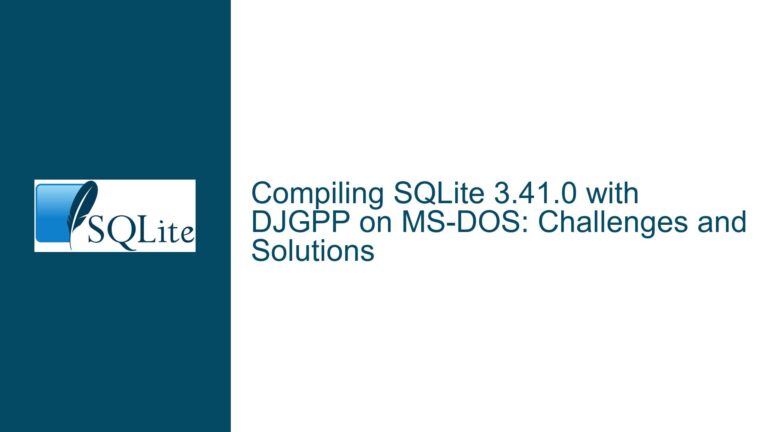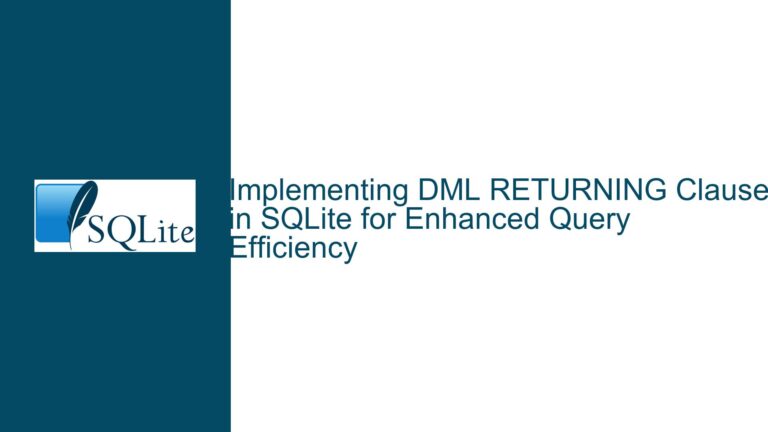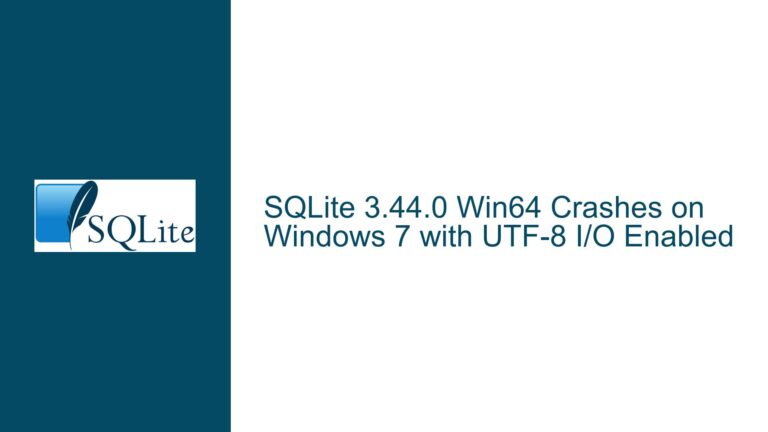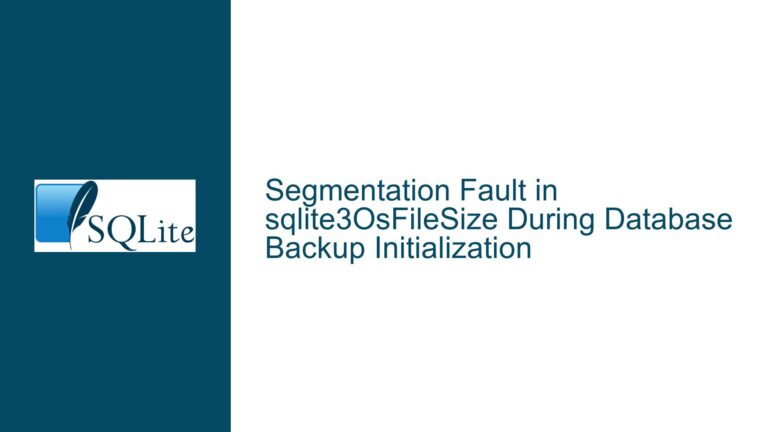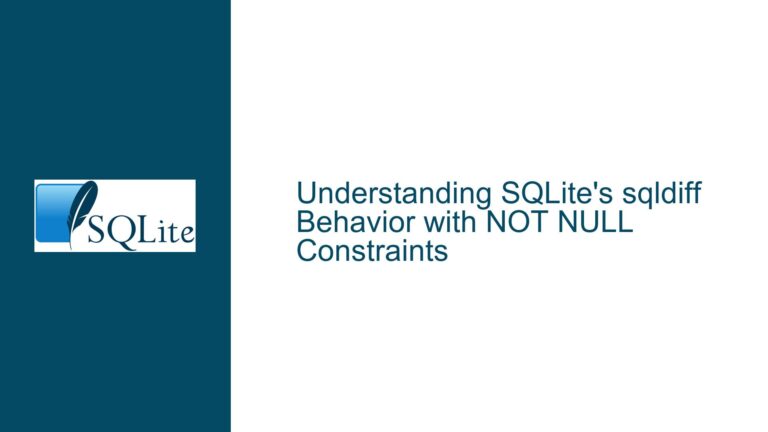Missing Command-Line Options in SQLite3 Shell -help Documentation
Undocumented SQLite3 Shell Features: EQP, Scanstats, Backslash, and Threadsafe
Code-Defined Command-Line Flags Not Listed in -help Output
Issue Overview
The SQLite3 command-line shell (sqlite3) includes several command-line options that are implemented in code but omitted from the documentation generated by the -help flag. These include:
-eqpand-eqpfull: Control Explain Query Plan output modes.-scanstats: Enables diagnostic output for the SQLite query optimizer’s table-scan statistics.-backslash: Enables C-style backslash escape processing in SQL input strings.-threadsafe: Configures the threading mode of the SQLite library at startup.
These options are parsed and acted upon in the sqlite3 shell’s source code (shell.c), as evidenced by explicit conditional checks and configuration logic. For example:
-eqpand-eqpfullmodifydata.autoEQPto enable automatic EXPLAIN QUERY PLAN output.-scanstatssetsdata.scanstatsOnto activate optimizer statistics.-backslashtogglesSHFLG_Backslashto enable escape sequences.-threadsafedirectly configures SQLite’s threading model viasqlite3_config().
Despite their functional implementations, these flags are excluded from the -help output. This creates a disconnect between discoverability (via documentation) and usability (via code). Users unaware of these options may resort to less efficient workarounds or miss critical debugging tools.
Intentional Omission and Stability Concerns
Possible Causes
The absence of these options from the -help documentation stems from deliberate design decisions, as indicated by code comments and SQLite’s development philosophy:
Undocumented/Unsupported Features
The-backslashoption’s code comment explicitly states it is “undocumented,” indicating it is reserved for testing edge cases (e.g., injecting non-standard SQL syntax). Similarly,-eqp,-scanstats, and-threadsafemay be classified as:- Debugging Utilities: Tools meant for developers diagnosing query plans (
-eqp) or optimizer behavior (-scanstats). - Configuration Overrides: Flags like
-threadsafealter low-level library settings, which could destabilize the shell if misused.
- Debugging Utilities: Tools meant for developers diagnosing query plans (
Stability and Forward Compatibility
Undocumented options are not subject to SQLite’s strict compatibility guarantees. The development team reserves the right to modify or remove these flags without notice. Documenting them would imply support, increasing maintenance burden and risking user reliance on unstable features.Minimalist Documentation Philosophy
SQLite prioritizes concise, user-focused documentation. Including niche or advanced flags in-helpcould overwhelm casual users. Instead, such features are often disclosed in source code comments, developer guides, or community channels.Security and Misuse Prevention
Options like-backslashintroduce parsing behaviors that deviate from standard SQL. Public documentation might encourage unsafe practices, such as embedding unescaped user input.
Accessing and Safely Using Undocumented SQLite3 Shell Features
Troubleshooting Steps, Solutions & Fixes
1. Validating Undocumented Options
To confirm whether an option is supported:
- Source Code Inspection: Review
shell.c(e.g., SQLite’s fossil repo) forstrcmpchecks against command-line arguments. - Empirical Testing: Execute
sqlite3 <flag>with invalid syntax to observe error messages. Documented flags trigger “Usage:” hints; undocumented ones may silently execute or ignore invalid arguments.
Example:
sqlite3 -invalid-flag
# Output: "Usage: ..." (lists documented flags)
sqlite3 -backslash
# No error; shell starts with backslash escapes enabled
2. Using Undocumented Options
A. Explain Query Plan Modes
-eqp: EnablesEXPLAIN QUERY PLANfor each executed statement.sqlite3 -eqp mydb.db "SELECT * FROM tbl"-eqpfull: CombinesEXPLAIN QUERY PLANwith bytecode disassembly (EXPLAIN).
B. Scan Statistics
-scanstats: Outputs optimizer statistics (e.g., rows examined, index usage). Requires SQLite compiled withSQLITE_ENABLE_STAT4.sqlite3 -scanstats mydb.db "SELECT * FROM tbl"
C. Backslash Escapes
-backslash: Processes backslashes in SQL strings, e.g.,\nas newline.sqlite3 -backslash "SELECT 'Line 1\nLine 2';"
D. Threadsafe Configuration
-threadsafe <0|2|other>: Sets the threading mode:0: Single-threaded mode.2: Multi-threaded mode.- Default (any other value): Serialized mode.
sqlite3 -threadsafe 2
3. Risks and Mitigations
A. Version Sensitivity
Undocumented flags may behave differently across SQLite versions. For example, -eqp in 3.39.2 enables AUTOEQP_on, but future versions might deprecate this in favor of .eqp dot-commands.
Mitigation: Cross-reference options with the specific SQLite version’s source code.
B. Stability Issues
Using -threadsafe after initializing SQLite can cause undefined behavior. Threading mode must be set before any database connections.
Mitigation: Configure threading first in command-line arguments:
sqlite3 -threadsafe 0 -cmd "..." mydb.db
C. Security Risks
-backslash can bypass standard string escaping, exposing vulnerabilities if user input is embedded without parameterization.
Mitigation: Avoid combining -backslash with untrusted input. Prefer prepared statements or sanitization.
4. Alternatives to Undocumented Flags
A. Dot-Commands
Many shell features are accessible via interactive commands:
.eqp full: Equivalent to-eqpfull..scanstats on: Mirrors-scanstats.
B. PRAGMAs
Runtime settings can often be configured via SQL:
PRAGMA threadsafe;: Returns the current threading mode.
C. Environment Variables
Some behaviors are controllable via variables:
SQLITE_SHELL_DBNAME_PROC: Customizes shell startup (advanced).
5. Advocacy for Documentation Changes
To propose formalizing an undocumented flag:
- Submit a Documentation Patch: Fork the SQLite documentation, add the flag to
-help, and justify its inclusion. - Community Discussion: Raise the issue on SQLite’s mailing list or forum, citing use cases that warrant broader support.
Example Justification for -threadsafe:
“Explicit threading configuration is critical for embedding the shell in multi-threaded applications. Documenting
-threadsafereduces the risk of misconfiguration-induced crashes.”
6. Building a Custom Shell
For environments requiring guaranteed access to undocumented flags:
- Modify
shell.cto include desired flags in theshowHelp()function. - Recompile using SQLite’s amalgamation distribution:
gcc -DSQLITE_THREADSAFE=0 -o sqlite3-custom shell.c sqlite3.c -lpthread -ldl
7. Navigating SQLite’s Support Policy
Recognize that:
- Documented Features: Guaranteed backward compatibility (e.g.,
.tables,-header). - Undocumented Features: Use at your own risk; may vanish without warning.
When to Rely on Undocumented Flags:
- Short-term debugging.
- Controlled environments (e.g., internal scripts pinned to a specific SQLite version).
This guide equips users to leverage SQLite3’s hidden command-line options while understanding the trade-offs. By aligning expectations with SQLite’s design principles, developers can avoid pitfalls and make informed decisions about using undocumented features.
